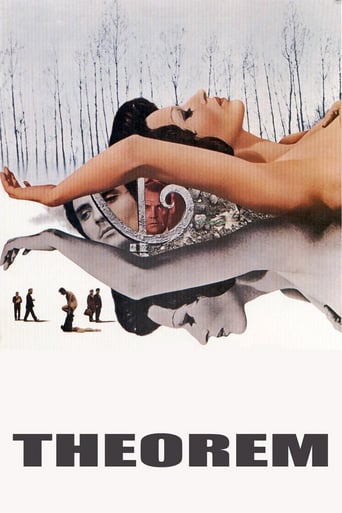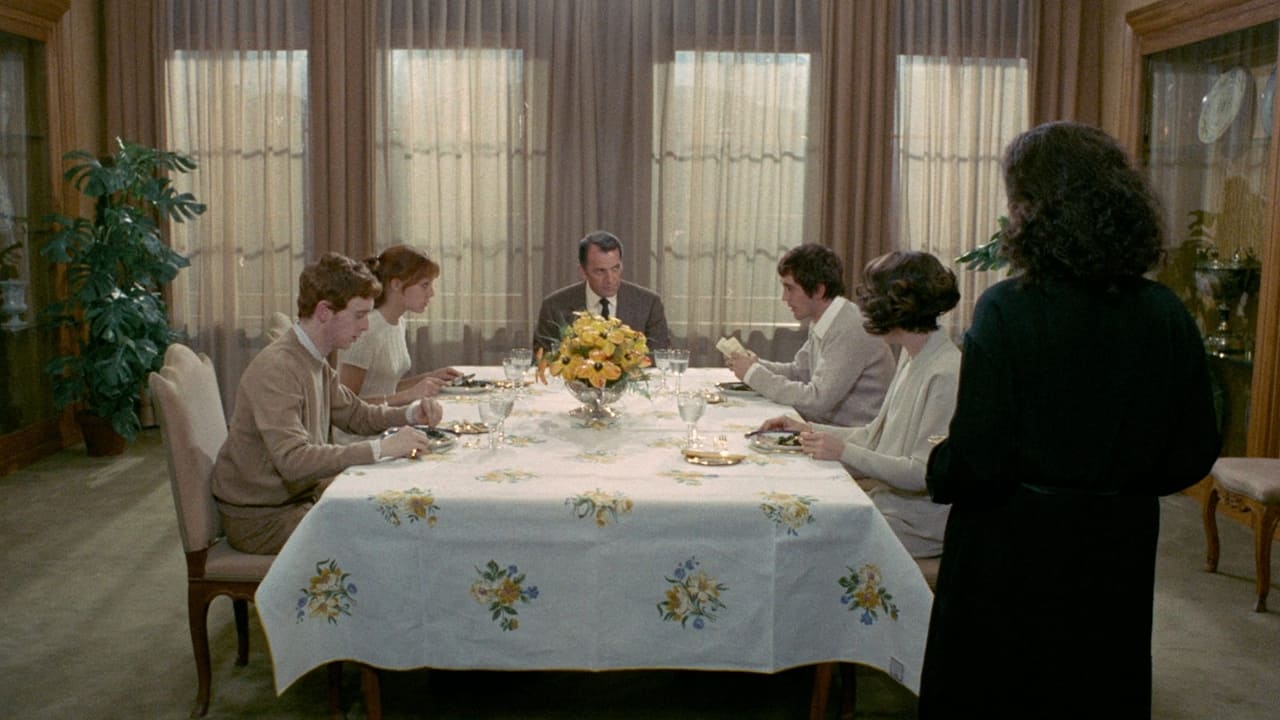Dario Vaccaro
Only Pasolini could've filmed something of this kind. No-one else is this crazy. Almost fifty years after its release, the interpretation of the film has been almost settled: the visitor is God or some other superhuman entity, the obsession the family members develop is the taste of the unknown and their final mental breakdown is the inability of the bourgeois to live authentic feelings and to break their own limits. Supporting this interpretation is Emilia's fate, who unlike her masters goes back to her birthplace and is changed in better, almost to a God-like state.Sure, this film is not for everyone, least of all for people who know nothing about the context of Pasolini's beliefs and Italian society. But when you get them, you see a masterpiece of artistry, which is so much so that it loses itself in its mystery and gives little to the watcher to take home. What I mean is that, like many successful attempts at genius, "Teorema" lacks any emotional response by its viewers and any response at all by non intellectuals. It is regardless a milestone in Italian cinema and an incredible showcase of dream-like artistry.
John Patrick Moore (jpm-onfocus)
Watching Teorema for the first time in 2017 it gave me a chill by the influence this movie clearly had on one of my favorite films of all time "Apartment Zero" (1988) - I know "Apartment Zero" so well that at times it felt (felt is the operative word)I was in their same universe. They are both socio-political psycho sexual tales. Terence Stamp and Hart Bochner even look related to each other. Colin Firth represents a Country in decadence with a past of elegant pride, Massimo Girotti represents, for me, exactly the same things for different reasons in different ways but they are both seduceable in the eyes of the stranger. To think that Teorema was made in 1968 and Apartment Zero in 1988, boggles the mind. Mine anyway.
Emil Bakkum
You may call me a seasoned film watcher who is willing to ponder over the possible intentions of the narrative. However, to me the film Teorema is devoid of any rational or logical meaning. A possible label of the style is surrealism, but surrealists employ a certain realism, albeit twisted, accuracy and precision. The story of Teorema is too sloppy and incoherent for that. Perhaps the best description is to compare the story to (post)modern art, which carries a similar message of laziness, fraud and swindle. In order to warn you, let me briefly sketch the events. The main characters are a bourgeois family, consisting of two parents, a son, a daughter and a housekeeper. A friend of the son visits the family, and starts sexual relations with everybody, except perhaps the father. He does not seduce them, but simply yields to their wishes. When he leaves, the inmates admit that their lives have been shattered. The housekeeper becomes a saint with divine powers, and finally merges with the earth. This daughter gets into a state of coma. The mother becomes a promiscuous nymphomane. The male characters develop the most interesting signs of disorder. The father wants to go back to his inner self. He gives his possessions to his employees, undresses, and runs into the desert. The son becomes a painter, who hides his lack of skills under a mask of conceit. There are certainly allusions in the film, but none of them takes the lead. For instance, it is possible that the painter is meant to portray the film maker, but the evidence is poor. Evidently, the film in itself makes no sense whatever, so that we have to base our interpretation on other sources. It was made in the days of la nouvelle vague, which produced films like "Tout va bien" (France) and "De minder gelukkige terugkeer van Joszef Katus naar het land van Rembrandt" (Netherlands). These stories are somewhat mysterious, and invite the viewer to make his own interpretation. The viewer is supposed to become a participant, and in fact the players sometimes directly address the audience. Typical for the nouvelle vague is also the moving camera. In Teorema these ideas are carried through to the extreme, leading to the above bizarre result. Another source is the Italian society. In those days she was a bizarre mixture of Bolshevism and Catholicism. A film maker had to address both cultures in order to create a commercial success. The only way to please both audiences is to say nothing, and this is precisely what Teorema does. Both the Bolshevists and Catholics are appeased by the display of their symbols, and the Catholics are only mildly provoked, suggesting that Pasolini is one of theirs. In fact the catholic spirit permeates most Italian films, even "La terra trema", which is supposed to be a socialist produce. You can not wipe out two millenia of history in a view decades. In conclusion, even the context of Teorema does not allow a satisfactory interpretation. The film can be seen as a glorification of Catholicism, socialism, promiscuity, art and culture, Freudian psychology, or simple life. Perhaps the wrath of God is actually the best explanation for the events. However, in another interpretation it is a plea for fascism or chastity. Or perhaps it is a self-portrait of the makers, and the chaos in their brains. Or the chaos of the (any) elite, which would be alarming. Only one thing is certain: Teorema is innovative. But not every innovation is an improvement. If you prefer social realism, consider seeing my other reviews.
Shuggy
Someone said you should look at your mood before rating this film. I had to walk an unnecessary kilometre to buy my ticket, someone was using a cellphone during the credits, and the WHOLE film was shown in a too-wide aspect ratio - after I had alerted the organisers, having seen the problem while watching the splash-page, over and over. (It was shown rather dimly off a DVD.) So I have to give the film a huge discount for my grumpiness.I didn't like it. I don't despise it, because I think Pasolini was sincere in making it, not trying to put one over us with pretentious piffle (cf Fellini). It's certainly not the worst film ever made, not dishonest, condescending or manipulative, just slow, opaque and uninvolving (but maybe the last is just me; see above).My (and most people's?) disconnect from Teorema is that we can no longer identify with the Italian Catholic guilt that overcame most of the family after succumbing to Terence Stamp's undoubted charms. He had sex with them (usually at their instigation - to say "he seduced them" is to exaggerate wildly) and a reaction is to be expected, but catatonia? Levitation and autointerment? Bad art? (OK, bad art.) And is there really a volcanic desert handy to the Milan (?) railway station that anyone can walk to naked without being intercepted?So when it (finally!) said "FINE" I said "Fine by me."


 AD
AD



